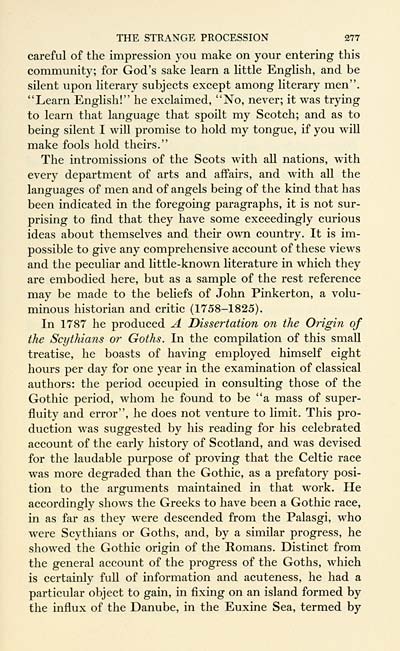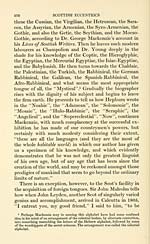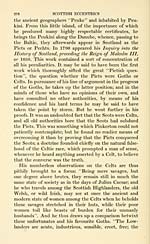Ossian Collection > Scottish eccentrics
(293)
Download files
Complete book:
Individual page:
Thumbnail gallery: Grid view | List view

THE STRANGE PROCESSION 277
careful of the impression you make on your entering this
community; for God's sake learn a little English, and be
silent upon literary subjects except among literary men".
"Learn English!" he exclaimed, "No, never; it was trying
to learn that language that spoilt my Scotch; and as to
being silent I will promise to hold my tongue, if you will
make fools hold theirs."
The intromissions of the Scots with all nations, with
every department of arts and affairs, and with all the
languages of men and of angels being of the kind that has
been indicated in the foregoing paragraphs, it is not sur-
prising to find that they have some exceedingly curious
ideas about themselves and their own country. It is im-
possible to give any comprehensive account of these views
and the peculiar and little-known literature in which they
are embodied here, but as a sample of the rest reference
may be made to the beliefs of John Pinkerton, a volu-
minous historian and critic (1758-1825).
In 1787 he produced A Dissertation on the Origin of
the Scythians or Goths. In the compilation of this small
treatise, he boasts of having employed himself eight
hours per day for one year in the examination of classical
authors: the period occupied in consulting those of the
Gothic period, whom he found to be "a mass of super-
fluity and error", he does not venture to limit. This pro-
duction was suggested by his reading for his celebrated
account of the early history of Scotland, and was devised
for the laudable purpose of proving that the Celtic race
was more degraded than the Gothic, as a prefatory posi-
tion to the arguments maintained in that work. He
accordingly shows the Greeks to have been a Gothic race,
in as far as they were descended from the Palasgi, who
were Scythians or Goths, and, by a similar progress, he
showed the Gothic origin of the Romans. Distinct from
the general account of the progress of the Goths, which
is certainly full of information and acuteness, he had a
particular object to gain, in fixing on an island formed by
the influx of the Danube, in the Euxine Sea, termed by
careful of the impression you make on your entering this
community; for God's sake learn a little English, and be
silent upon literary subjects except among literary men".
"Learn English!" he exclaimed, "No, never; it was trying
to learn that language that spoilt my Scotch; and as to
being silent I will promise to hold my tongue, if you will
make fools hold theirs."
The intromissions of the Scots with all nations, with
every department of arts and affairs, and with all the
languages of men and of angels being of the kind that has
been indicated in the foregoing paragraphs, it is not sur-
prising to find that they have some exceedingly curious
ideas about themselves and their own country. It is im-
possible to give any comprehensive account of these views
and the peculiar and little-known literature in which they
are embodied here, but as a sample of the rest reference
may be made to the beliefs of John Pinkerton, a volu-
minous historian and critic (1758-1825).
In 1787 he produced A Dissertation on the Origin of
the Scythians or Goths. In the compilation of this small
treatise, he boasts of having employed himself eight
hours per day for one year in the examination of classical
authors: the period occupied in consulting those of the
Gothic period, whom he found to be "a mass of super-
fluity and error", he does not venture to limit. This pro-
duction was suggested by his reading for his celebrated
account of the early history of Scotland, and was devised
for the laudable purpose of proving that the Celtic race
was more degraded than the Gothic, as a prefatory posi-
tion to the arguments maintained in that work. He
accordingly shows the Greeks to have been a Gothic race,
in as far as they were descended from the Palasgi, who
were Scythians or Goths, and, by a similar progress, he
showed the Gothic origin of the Romans. Distinct from
the general account of the progress of the Goths, which
is certainly full of information and acuteness, he had a
particular object to gain, in fixing on an island formed by
the influx of the Danube, in the Euxine Sea, termed by
Set display mode to: Large image | Transcription
Images and transcriptions on this page, including medium image downloads, may be used under the Creative Commons Attribution 4.0 International Licence unless otherwise stated. ![]()
| Early Gaelic Book Collections > Ossian Collection > Scottish eccentrics > (293) |
|---|
| Permanent URL | https://digital.nls.uk/81911860 |
|---|
| Description | Selected books from the Ossian Collection of 327 volumes, originally assembled by J. Norman Methven of Perth. Different editions and translations of James MacPherson's epic poem 'Ossian', some with a map of the 'Kingdom of Connor'. Also secondary material relating to Ossianic poetry and the Ossian controversy. |
|---|
| Description | Selected items from five 'Special and Named Printed Collections'. Includes books in Gaelic and other Celtic languages, works about the Gaels, their languages, literature, culture and history. |
|---|

